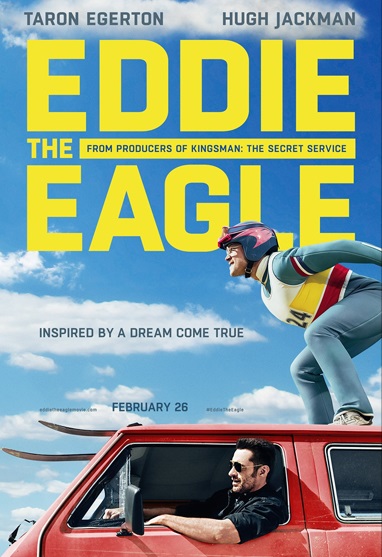THE AISLE SEAT - by Mike McGranaghan
"EDDIE THE EAGLE"

In 1993, Cool Runnings took an inspiring true fish-out-of-water story -- Jamaican bobsled team makes the Olympics –- and fashioned it into a goofy feel-good comedy. It was by no means a great film, but it had a certain charm that audiences responded to. Eddie the Eagle is a modern-day Cool Runnings. You can feel it squeezing the round peg of a true story into the square hole of a mainstream three-act format. Not that it matters much. The tale of Eddie Edwards, a tenacious British man who parlayed his Olympic dreams into an unlikely personal victory at the 1988 games, is pretty hard to resist.
Taron Egerton (Kingsmen: The Secret Service) plays Eddie, a myopic, socially awkward young man who has aspired to compete in the Olympics since childhood. When he's unfairly dismissed from Britain's skiing team, he takes a back-door approach, exploiting a loophole to essentially become a one-man ski jump squad. He doesn't actually know anything about ski jumping, but he's got a lot of determination. A former U.S. champ, Bronson Peary (Hugh Jackman), takes pity on Eddie, teaching him how to land without killing or injuring himself. Eventually, Eddie improbably makes his way to the Olympics in Calgary, where he opts to compete in the dangerous 90-meter jump, despite never having tackled it before.
Eddie the Eagle has all of the things you would expect from an “inspirational” true story told in a deliberately crowd-pleasing style: a disapproving father who has to be won over, a stuffy British Olympic committee that unfairly tries to halt Eddie's progress, snooty rivals for him to compete against, and an old-fashioned training montage set to a pop song. There is not a beat in the formula that Eddie the Eagle fails to hit. To the film's credit, director Dexter Fletcher embraces the idea of using that formula. The story takes place in 1988, and Fletcher deliberately structures it like a movie from that decade. (It would not be surprising to find out that Rocky IV was a major influence here.) So while it's often very paint-by-numbers, the approach is intentional, possibly even a little tongue-in-cheek. When the film plays Van Halen's “Jump” after Eddie makes a successful jump, you strongly suspect the cheesiness is on purpose.
Of course, large sections of the story are totally made up, most notably everything involving Jackman's character, so you can't take the movie beyond face value. That said, face value in this instance is pretty darned entertaining. The ski jump footage is incredible, not only for the way it shows both the grace and the danger of the sport, but also in the way it gives you an indication of what it would be like to participate. Fletcher has his camera go up and down the slope to emphasize how intimidating the ride is. Every time the unskilled Eddie spontaneously decides to try a bigger jump, you worry about him.
The heart of the story, though, is that Eddie Edwards didn't really do all that well, famously coming in dead last. He's notable for refusing to give up, even when he should have by all conventional standards. More than anything, this is the element of Eddie the Eagle that sinks its hooks into you. Here's a man who doesn't believe it's necessary to win; he just thinks it's necessary to try. That's an astonishingly potent message in today's super-competitive world, where “victory” is seen as the be-all and end-all. The movie rings its hero's bell loud and clear, unequivocally stating that simply having the courage to pursue your dream is the only victory that matters in the end. Maybe cold-hearted people will reject that idea; the rest of us will be overcome with the warm-fuzzies.
Taron Egerton is very good in the lead role, although it's a little strange that Eddie is written as somewhat differently-abled in an intellectual sense. (I assumed, from his portrayal here, that Eddie was autistic, but some post-movie research indicates that is not true.) The actor conveys a relentless can-do spirit that fuels the movie in just the right way. Hugh Jackman, meanwhile, largely avoids “grizzled, drunken mentor” cliches, turning in a performance that is often quite funny, especially during a sequence in which Bronson encourages Eddie to think of jumping in sexual terms. Amusing chemistry between the two actors is another strength.
Eddie the Eagle isn't particularly original, nor is it complex, nuanced, or sophisticated. But is it entertaining and heart-warming? Absolutely. It's the cinematic equivalent of one of those inspirational posters featuring kittens and sayings about how you should “hang in there” no matter what. Those kittens sure are cute, aren't they? And it's true – you really should hang in there no matter what.
(![]()
![]()
![]() out of four)
out of four)
Eddie the Eagle is rated PG-13 for some suggestive material, partial nudity, and smoking. The running time is 1 hour and 45 minutes.
Buy a copy of my book, "Straight-Up Blatant: Musings From The Aisle Seat," on sale now at Lulu.com! Paperback and Kindle editions also available at Amazon.com!


